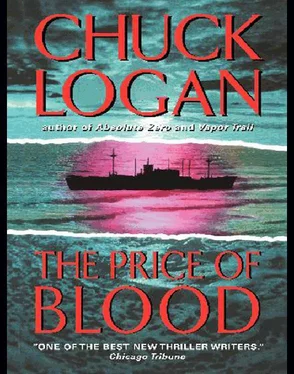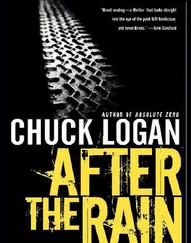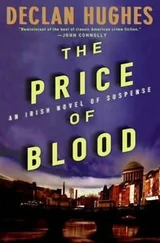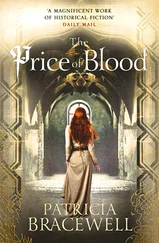Chuck Logan - The Price of Blood
Здесь есть возможность читать онлайн «Chuck Logan - The Price of Blood» весь текст электронной книги совершенно бесплатно (целиком полную версию без сокращений). В некоторых случаях можно слушать аудио, скачать через торрент в формате fb2 и присутствует краткое содержание. Жанр: Криминальный детектив, на английском языке. Описание произведения, (предисловие) а так же отзывы посетителей доступны на портале библиотеки ЛибКат.
- Название:The Price of Blood
- Автор:
- Жанр:
- Год:неизвестен
- ISBN:нет данных
- Рейтинг книги:4 / 5. Голосов: 1
-
Избранное:Добавить в избранное
- Отзывы:
-
Ваша оценка:
- 80
- 1
- 2
- 3
- 4
- 5
The Price of Blood: краткое содержание, описание и аннотация
Предлагаем к чтению аннотацию, описание, краткое содержание или предисловие (зависит от того, что написал сам автор книги «The Price of Blood»). Если вы не нашли необходимую информацию о книге — напишите в комментариях, мы постараемся отыскать её.
The Price of Blood — читать онлайн бесплатно полную книгу (весь текст) целиком
Ниже представлен текст книги, разбитый по страницам. Система сохранения места последней прочитанной страницы, позволяет с удобством читать онлайн бесплатно книгу «The Price of Blood», без необходимости каждый раз заново искать на чём Вы остановились. Поставьте закладку, и сможете в любой момент перейти на страницу, на которой закончили чтение.
Интервал:
Закладка:
But what if he was?
They drove on without speaking. Trin turned left before they came to Tuna’s bridge and drove toward the coast on a gravel road. The cars, trucks, and hordes of motorbikes disappeared and they were in the countryside among more traditional traffic: water buffalo, bicycle, and foot.
The land now conformed more to the pictures in Broker’s memory, except for the concrete struts of electric powerlines and telephone lines strung through the rice paddies. And the red flags hanging from the houses. They passed another cemetery with a bleached crop of stone under a red cement star.
Broker cranked down the window and turned off the air conditioning. “We won’t have AC where we’re going. I better get used to it.” Trin nodded and opened his window.
The air was a swimming pool. The breeze was an itching pepper of red dust. Broker’s determination to wear his sweat like a pro ran out his pores. He reached for an omnipresent liter of bottled water.
But Trin’s spirits revived in the rice fields, away from the noisy highway. He worked a jigsaw on the dusty roads, weaving in and out of plodding farmers and school kids on bikes. Twice they stopped. To snack on bananas and then for some iced Huda beer. But really they paused to watch the traffic behind them. Two hours into the fields and farms Trin decided they were not being followed.
“Interesting,” said Trin, more centered now. “Cyrus can’t afford to trust even one Vietnamese.”
Then he drove to a riverbank and they waited for a small car ferry powered by a sampan with dual out-boards. Slowly they crossed the muddy river. On the other side they waited an hour. When no one else used the ferry they stopped looking over their shoulders and drove straight for the coast.
The country began to change: patchy white sand diluted the green palette of tree line and paddy and then the trees thinned out. The green and white gingham landscape became more solitary as the farmhouses and fields bordered in the reddish earth leaked away. They went by another stark grid of rectangular cement coffins guarded by a truncated pillar.
“Quang Tri,” said Trin absently.
Through a veil of sweat, Broker saw thickets of traditional graves everywhere he looked. Mounded earth. Circular walls. Square walls. Painted, unpainted, weeded, unweeded. Even his unseen destination was a grave, lined with gold bars and Ray Pryce’s bones. He wondered if the heat and the pressure had finally boiled away his rocky North Shore good sense. He was out here all alone in this foreign land with a tormented alcoholic for a guide. Jimmy Tuna’s ghost held him captive and pointed the way. Nina’s life rolled like dice.
He had crossed oceans and continents and now he wondered if he had blundered across the Buddhist frontier into a swarming landscape where the dead still cast shadows.
Quang Tri . More than bones were buried here. Empires.
And Broker, who didn’t dream, except in Vietnam, reminded himself that he didn’t believe in ghosts.
Except in Vietnam.
Come sundown, he mused, the Quang Tri night must draw a crowd; betel nut-chewing ghosts with big, knobby rice-paddy toes who squatted gook-fashion and haggled in their jabber talk; slim, elegant cosmopolitan city ghosts who conversed in French, or swore like legionnaires, and the Japanese and Mongol would-be conquerors and how many million Chinese grunts from the Middle Kingdom who made a one-way trip down here…
And the most recent members of the club, gangs of young rubbernecking American GIs who wandered through these graveyards whistling sixties’ tunes. Dummies who never got the word about the Buddhist recycling program…
In from the sticks and utterly lost in the big city of death.
There were still occasional farms, set among meandering white furrows garnished with green.
“Sweet potatoes,” explained Trin. “The only thing that really grows out here.” He slowed and pointed. Two rusty teardrop-shaped projectiles lay by the side of the road, marked by a stick and strip of white cloth. Old mortar rounds.
They left the meager farms behind and entered rolling dunes patched with scrub, spindly willow trees. The desolation was interrupted only by the remnants of abandoned hamlets, their outlines softened by the shifting sand. And one more military cemetery-out all alone in the dunes.
“We’re almost there. You can smell the sea,” said Trin. And Broker saw it, a band of glittering blue-green between the dunes. The dizzy relief of a breeze swayed the spindly willows.
“Now we walk,” said Trin. They got out and Broker carried two of the beer cases. Trin hauled the other case, the smokes, and the camera. They plodded toward a red flag flying over the willows and came through the trees onto a sand beach. The sea blended placidly into a deceptively calm, baked-enamel blue sky. A buckled cement ramp poked from the sand, all that remained of the old Cua Viet Riverine base. Down the beach Broker saw a tall, new white lighthouse.
Two young men in tan shirts, brown trousers, and bare feet hailed Trin from the beach. He called back. One wore a wide-brimmed brown hat with a visor and had green epaulets on his shoulder and a red armband.
“Militia sergeant,” said Trin. “He’s a good guy.”
Three more young soldiers were in the small head-quarters tucked into the willows. On the way in Broker marked the radio cord draped from a field antennae that leaned, unsteady on its sloppy guide wires. Inside, Trin stacked the beer and handed over the cigarettes amid much deferential gab and more than a few bows.
The radio lead came in through a window and stopped. No radio. A stout, padlocked chest-high wooden bureau took up one whole wall. Maybe the radio was in there, with the guns. The militia had no apparent means of transportation besides their feet. Nobody was armed. Nobody seemed concerned. Maybe they weren’t really soldiers. Maybe they just all bought their clothes at the same place.
The militia insisted they sit down for tea at a rickety table. Ho Chi Minh smiled down on them like a big-eyed alley cat from a calendar tacked to the wall. “The camera,” said Trin. Broker took the camera from its cardboard box and fumbled in the heat. Sweaty fingers dripping on the instructions, he loaded the film.
All smiles, the militia straightened their tunics; one of them combed his hair; the sergeant struck a matinee idol pose. Broker hoped the camera worked.
“They have guns?” Broker wondered.
“Oh yes. AKs and grenades and one RPD machine gun,” Trin assured him.
The camera worked. Broker continued to take pictures as more members of the militia platoon arrived. He handed over the sheets of film as they popped out. The militia boys clustered around, chatting happily as their pictures swam up from the chemistry. “Do they have a radio?” he asked.
“Yes. Locked up, with the guns.”
Broker wondered if the Communist party trusted them with the key. “Do we have a radio? At the home?”
“No. We have a truck. We’ll send somebody in the truck or the van, at the right time.”
Broker clicked his teeth. They had pimples. They were kids. “What are you telling them?”
“Oh, just talk, about their families.” Seeing Broker’s consternation, Trin reassured him. “Don’t worry. They’ve never been shot at before, so they’ll be very eager. When we tell them that American pirates are stealing antiquities they’ll be tigers.”
“Antiquities?”
“Yes. There has been a big party campaign about foreigners taking our treasures, since eighty-nine.”
Broker wasn’t reassured. He sat in an isolation booth of language, with flies crawling on his fingers. Trin smiled. The militia smiled. Heat-induced paranoia scripted the casual conversation. This dumb fucking American is going to show me where a fortune is buried on the beach. Some more dumb Americans have a big boat. The hole the treasure is in will be big enough to bury them all …
Читать дальшеИнтервал:
Закладка:
Похожие книги на «The Price of Blood»
Представляем Вашему вниманию похожие книги на «The Price of Blood» списком для выбора. Мы отобрали схожую по названию и смыслу литературу в надежде предоставить читателям больше вариантов отыскать новые, интересные, ещё непрочитанные произведения.
Обсуждение, отзывы о книге «The Price of Blood» и просто собственные мнения читателей. Оставьте ваши комментарии, напишите, что Вы думаете о произведении, его смысле или главных героях. Укажите что конкретно понравилось, а что нет, и почему Вы так считаете.












